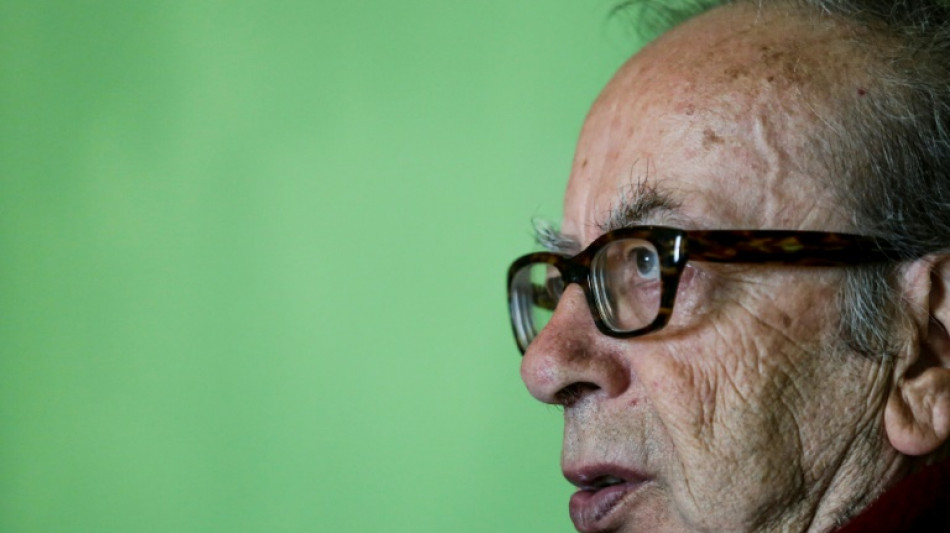
-
 Romania, Argentina leaders invited to Trump 'Board of Peace' meeting
Romania, Argentina leaders invited to Trump 'Board of Peace' meeting
-
Kamindu heroics steer Sri Lanka past Ireland in T20 World Cup

-
 Age just a number for veteran Olympic snowboard champion Karl
Age just a number for veteran Olympic snowboard champion Karl
-
England's Feyi-Waboso out of Scotland Six Nations clash

-
 Thailand's pilot PM lands runaway election win
Thailand's pilot PM lands runaway election win
-
Sarr strikes as Palace end winless run at Brighton

-
 Olympic star Ledecka says athletes ignored in debate over future of snowboard event
Olympic star Ledecka says athletes ignored in debate over future of snowboard event
-
French police arrest six over crypto-linked magistrate kidnapping

-
 Auger-Aliassime retains Montpellier Open crown
Auger-Aliassime retains Montpellier Open crown
-
Lindsey Vonn, skiing's iron lady whose Olympic dream ended in tears

-
 Conservative Thai PM claims election victory
Conservative Thai PM claims election victory
-
Kamindu fireworks rescue Sri Lanka to 163-6 against Ireland

-
 UK PM's top aide quits in scandal over Mandelson links to Epstein
UK PM's top aide quits in scandal over Mandelson links to Epstein
-
Reed continues Gulf romp with victory in Qatar

-
 Conservative Thai PM heading for election victory: projections
Conservative Thai PM heading for election victory: projections
-
Vonn crashes out of Winter Olympics in brutal end to medal dream

-
 Heartache for Olympic downhill champion Johnson after Vonn's crash
Heartache for Olympic downhill champion Johnson after Vonn's crash
-
Takaichi on course for landslide win in Japan election

-
 Wales coach Tandy will avoid 'knee-jerk' reaction to crushing England loss
Wales coach Tandy will avoid 'knee-jerk' reaction to crushing England loss
-
Sanae Takaichi, Japan's triumphant first woman PM

-
 England avoid seismic shock by beating Nepal in last-ball thriller
England avoid seismic shock by beating Nepal in last-ball thriller
-
Karl defends Olympic men's parallel giant slalom crown

-
 Colour and caution as banned kite-flying festival returns to Pakistan
Colour and caution as banned kite-flying festival returns to Pakistan
-
England cling on to beat Nepal in last-ball thriller

-
 UK foreign office to review pay-off to Epstein-linked US envoy
UK foreign office to review pay-off to Epstein-linked US envoy
-
England's Arundell eager to learn from Springbok star Kolbe

-
 Czech snowboard great Ledecka fails in bid for third straight Olympic gold
Czech snowboard great Ledecka fails in bid for third straight Olympic gold
-
Expectation, then stunned silence as Vonn crashes out of Olympics

-
 Storm-battered Portugal votes in presidential election run-off
Storm-battered Portugal votes in presidential election run-off
-
Breezy Johnson wins Olympic downhill gold, Vonn crashes out

-
 Vonn's Olympic dream cut short by downhill crash
Vonn's Olympic dream cut short by downhill crash
-
French police arrest five over crypto-linked magistrate kidnapping

-
 Late Jacks flurry propels England to 184-7 against Nepal
Late Jacks flurry propels England to 184-7 against Nepal
-
Vonn crashes out of Winter Olympics, ending medal dream

-
 All-new Ioniq 3 coming in 2026
All-new Ioniq 3 coming in 2026
-
Takaichi wins big in Japan election, media projections show

-
 New Twingo e-tech is at the starting line
New Twingo e-tech is at the starting line
-
New Ypsilon and Ypsilon hf

-
 The Cupra Raval will be launched in 2026
The Cupra Raval will be launched in 2026
-
New id.Polo comes electric

-
 Iran defies US threats to insist on right to enrich uranium
Iran defies US threats to insist on right to enrich uranium
-
Seifert powers New Zealand to their record T20 World Cup chase

-
 Naib's fifty lifts Afghanistan to 182-6 against New Zealand
Naib's fifty lifts Afghanistan to 182-6 against New Zealand
-
Paul Thomas Anderson wins top director prize for 'One Battle After Another'

-
 De Beers sale drags in diamond doldrums
De Beers sale drags in diamond doldrums
-
NFL embraces fashion as league seeks new audiences

-
 What's at stake for Indian agriculture in Trump's trade deal?
What's at stake for Indian agriculture in Trump's trade deal?
-
Real Madrid can wait - Siraj's dream night after late T20 call-up

-
 Castle's monster night fuels Spurs, Rockets rally to beat Thunder
Castle's monster night fuels Spurs, Rockets rally to beat Thunder
-
Japan votes in snow-hit snap polls as Takaichi eyes strong mandate


Ismail Kadare: A bright light in Albania's darkest days
Novelist Ismail Kadare -- who has died aged 88 -- used his pen as a stealth weapon to survive Albania's paranoid communist dictator Enver Hoxha.
His sophisticated storytelling -- often likened to that of George Orwell or Franz Kafka -- used metaphor and irony to reveal the nature of tyranny under Hoxha, who ruled Albania from 1946 until his death in 1985.
"Dark times bring unpleasant but beautiful surprises," Kadare told AFP.
"Literature has often produced magnificent works in the dark ages as if it were seeking to remedy the misfortune inflicted on people," he said.
He was often tipped to win a Nobel prize for his towering body of work which delved into his country's myths and history to dissect the mechanisms of totalitarianism.
Kadare's novels, essays and poems have been translated into more than 40 languages, making him the Balkans' best-known modern novelist.
The prolific writer broke ranks with isolated Albania's communists and fled to Paris a few months before the government collapsed in the early 1990s.
He wrote about his disillusionment in his book "The Albanian Spring -- The Anatomy of Tyranny".
- Demanded his death -
Born in Gjirokaster in southern Albania on January 28, 1936, Kadare was inspired by Shakespeare's "Macbeth" as a child and counted the playwright, as well as Dante and Cervantes, among his heroes.
Ironically, the dictator Hoxha hailed for the same mountain town.
Kadare studied languages and literature in Tirana before attending the Gorky Institute of World Literature in Moscow.
After returning to Albania in 1960, he initially won acclaim as a poet before publishing his first novel "The General of the Dead Army" in 1963, a tragicomic tale that was later translated into dozens of other languages.
His second novel, "The Monster", about townspeople who live in a permanent state of anxiety and paranoia after a wooden Trojan horse appears outside the town, was banned.
His 1977 novel "The Great Winter", though somewhat favourable towards the regime, angered Hoxha devotees who deemed it insufficiently laudatory and demanded the "bourgeois" writer's execution.
Yet while some writers and other artists were imprisoned -- or even killed -- by the government, Kadare was spared.
Hoxha's widow Nexhmije said in her memoirs that the Albanian leader, who prided himself on a fondness for literature, saved the internationally acclaimed author several times.
Archives from the Hoxha era show that Kadare was often close to being arrested, and after his poem "Red Pashas" was published in 1975 he was banished to a remote village for more than a year.
Kadare, for his part, denied any special relationship with the dictator.
"Against whom was Enver Hoxha protecting me? Against Enver Hoxha," Kadare told AFP in 2016 of the brutal, all-powerful ruler.
- 'Writers don't have to bow' -
Academics have often pondered whether Kadare was a darling of Hoxha or a brave author risking prison and death?
"Both are true," suggested French publisher Francois Maspero, who raised the question in his book "Balkans-Transit".
Writing such work under a government in which a single word could turn against its author "requires, above all, determination and courage", Maspero wrote.
"My work obeyed only the laws of literature, it obeyed no other law," Kadare said.
In 2005 he won the inaugural Man Booker International Prize for his body of work. He was described by chief judge John Carey as "a universal writer in a tradition of storytelling that goes back to Homer".
The father of two reflected on his native Balkans in "Elegy for Kosovo" published in 2000, a year after NATO went to war against Belgrade to end Serbian repression in the predominantly ethnic Albanian province.
Speaking to AFP in 2019, Kadare said he enjoys seeing his name "mentioned among the candidates" for the Nobel, even if the topic "embarrasses" him.
"I am not modest because, in principle, I am against modesty," he said.
"During the totalitarian regime, modesty was a call to submission. Writers don't have to bow their heads."
burs-rob-bme/ljv/gd/fg
K.AbuTaha--SF-PST

